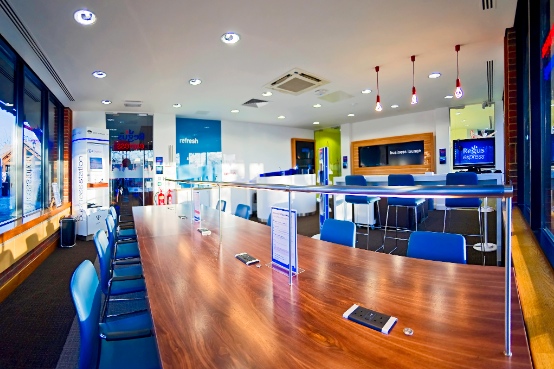In the second part of an exclusive interview with Officing Today, Regus UK CEO Richard Morris shares his views on independent business centre operators, and why the company is looking outside of Central London as part of its ongoing expansion drive.
Regus UK’s chief executive officer Richard Morris says that the flexible workspace industry has the ability to reach an “incredible” range of business owners.
 “We are barely scratching the surface” of its market potential, he said in part one of Officing Today’s interview.
“We are barely scratching the surface” of its market potential, he said in part one of Officing Today’s interview.
While Regus itself is a multinational operator of serviced office space, spanning over 100 countries worldwide, there are a significant number of successful independent business centre operators.
But is there a future for independent operators, or will the business centre landscape eventually become dominated by larger brands?
“It’s a good question,” says Morris. “I don’t see a reason why the market should become dominated by larger operators.
“I believe independents will always thrive – they know their local market and they have developed a good reputation within their regional area.”
In fact, this is an area in which Regus UK plans to expand.
“We have recently launched new locations in Hull, Livingston and Wigan,” says Morris. “We are keen to expand our coverage and continue bringing Regus business centres to UK places in which we currently lack a presence.”
He added that Regus UK plans to launch in additional regional areas including Greater Manchester, Ashford (Kent), and Coventry in the West Midlands.
While Morris stopped short of putting a figure on the number of new business centre locations to come this year, he suggested that another key expansion area for Regus UK lies within the M25 boundary of Greater London.
“In London, the rising cost of rent both for flexible and conventional leases means demand will be pushed out to the outer regions,” he says.
Third place working
Another key element of the company’s expansion strategy is the rollout of its ‘third place’ work hubs.
 Morris explained that Regus UK plans to further expand this part of the business, which are currently located in transport stations like motorway service stations, train stations, airports and even retail outlets.
Morris explained that Regus UK plans to further expand this part of the business, which are currently located in transport stations like motorway service stations, train stations, airports and even retail outlets.
Regus Express is currently located along key UK motorway and road networks including service stations on the M1, M40, M25 and M6, and at international airports including London Gatwick, Heathrow, Manchester Airport, and Birmingham Airport.
It also has locations at retail outlets including Fort Kinnaird Retail Park in Edinburgh and Meadowhall in Sheffield.
Morris says he is “happy” with the progress of ‘third place’ work locations and confirmed that it remains a focus of Regus UK’s broader expansion strategy.
“There is good demand for drop-in use by people who want to work on the move. They have become an important amenity for users and we will continue to respond to customer needs by focusing on workspace hubs in strategic locations.”
Coworking a “natural extension”
This also extends to Regus UK’s business lounges and coworking spaces, which Morris describes as a “logical and natural extension” of the company’s workplace offering.
“It’s about providing the right mix of workspace under one roof, location by location. We deliver coworking depending on demand and availability. Some markets are expanding, others are not.”
It’s this diverse blend of workspace that enables the business centre industry to reach such a broad range of clients, from home-based freelancers and travelling professionals right up to FTSE 100 firms. Offering instant availability for on-demand workspace like meeting rooms and coworking space enables business centres to reach out to ‘drop-in’ workers and smaller firms, but as Morris says, close attention should be paid to achieving the “right balance” of workspace.
The company aims to offer the right amount of space according to the size of the business centre and the location. Morris explained that a constant surplus of vacant space – including meeting rooms and coworking space – would indicate an imbalance in supply compared to demand.
“Of course there are fluctuations according to the time of year and seasonal variations,” says Morris. “During these times demand for meeting space can be lower or higher, like hotels – that’s the nature of the market.
“There must be a good level of meeting space to attract demand, but it’s important to hit the right balance.”
On the subject of balance, and with Regus UK’s ongoing expansion in new towns and regional locations in mind, it appears there is certainly a surplus of untapped opportunities for the business centre market in locations right across the country. And, perhaps unusually, Central London is currently off the radar.
With many parts of the UK fully recovered and other areas “stabilising” following the recession, Morris is confident that there are ample opportunities for future growth, both for Regus UK and for the wider flexible workspace market – and he feels that this will be demonstrated upon Regus UK’s half yearly reports, set to be released later this month.
“The economy is growing and is in good shape, and we will see the impact of this in company reports released at the end of August,” he added.



 Dr. Gleb Tsipursky – The Office Whisperer
Dr. Gleb Tsipursky – The Office Whisperer Nirit Cohen – WorkFutures
Nirit Cohen – WorkFutures Angela Howard – Culture Expert
Angela Howard – Culture Expert Drew Jones – Design & Innovation
Drew Jones – Design & Innovation Jonathan Price – CRE & Flex Expert
Jonathan Price – CRE & Flex Expert













